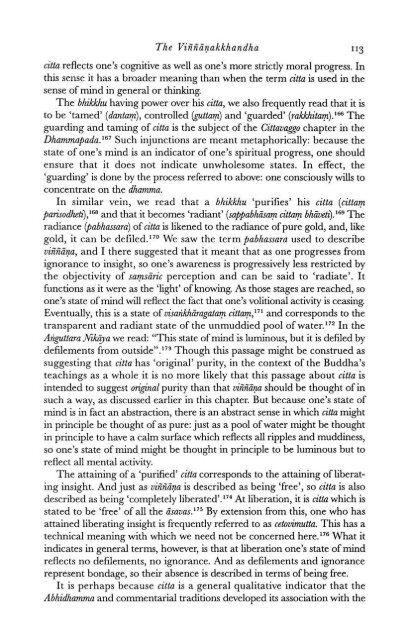Identity and Experience_Hamilton_1996
Identity and Experience_Hamilton_1996
Identity and Experience_Hamilton_1996
Create successful ePaper yourself
Turn your PDF publications into a flip-book with our unique Google optimized e-Paper software.
The Viiiiiiinakkh<strong>and</strong>ha 113<br />
citta reflects one's cognitive as well as one's more strictly moral progress. In<br />
this sense it has a broader meaning than when the term citta is used in the<br />
sense of mind in general or thinking.<br />
The bhikkhu having power over his citta, we also frequently read that it is<br />
to be 'tamed' (dantam), controlled (guttam) <strong>and</strong> 'guarded' (raWchitam).'66 The<br />
guarding <strong>and</strong> taming of citta is the subject of the Cittavaggo chapter in the<br />
Dhamma~ada.'~~ Such injunctions are meant metaphorically: because the<br />
state of one's mind is an indicator of one's spiritual progress, one should<br />
ensure that it does not indicate unwholesome states. In effect, the<br />
'guarding' is done by the process referred to above: one consciously wills to<br />
concentrate on the dhamma.<br />
In similar vein, we read that a bhikkhu 'purifies' his citta (cittam<br />
pani0dhet2),'~~ <strong>and</strong> that it becomes 'radiant' (sappabhfiam cittam bhavetz). 169 The<br />
radiance (pabhmsara) of citta is likened to the radiance of pure gold, <strong>and</strong>, like<br />
gold, it can be defiled.170 We saw the term pabhassara used to describe<br />
uifiiiana, <strong>and</strong> I there suggested that it meant that as one progresses from<br />
ignorance to insight, so one's awareness is progressively less restricted by<br />
the objectivity of samsaric perception <strong>and</strong> can be said to 'radiate'. It<br />
functions as it were as the 'light' of knowing. As those stages are reached, so<br />
one's state of mind will reflect the fact that one's volitional activity is ceasing.<br />
Eventually, this is a state of visankhZragatam cittam,171 <strong>and</strong> corresponds to the<br />
transparent <strong>and</strong> radiant state of the unmuddied pool of water. 17* In the<br />
Anguttara Nihya we read: "This state of mind is luminous, but it is defiled by<br />
defilements from outside".173 Though this passage might be construed as<br />
suggesting that citta has 'original' purity, in the context of the Buddha's<br />
teachings as a whole it is no more likely that this passage about citta is<br />
intended to suggest original purity than that vifiiiina should be thought of in<br />
such a way, as discussed earlier in this chapter. But because one's state of<br />
mind is in fact an abstraction, there is an abstract sense in which citta might<br />
in principle be thought of as pure: just as a pool of water might be thought<br />
in principle to have a calm surface which reflects all ripples <strong>and</strong> muddiness,<br />
so one's state of mind might be thought in principle to be luminous but to<br />
reflect all mental activity.<br />
The attaining of a 'purified' citta corresponds to the attaining of liberating<br />
insight. And just as viiiiiina is described as being 'free', so citta is also<br />
described as being 'completely liberated'. 174 At liberation, it is citta which is<br />
stated to be 'free' of all the a~auas."~ By extension from this, one who has<br />
attained liberating insight is frequently referred to as cetovimutta. This has a<br />
technical meaning with which we need not be concerned here.176 What it<br />
indicates in general terms, however, is that at liberation one's state of mind<br />
reflects no defilements, no ignorance. And as defilements <strong>and</strong> ignorance<br />
represent bondage, so their absence is described in terms of being free.<br />
It is perhaps because citta is a general qualitative indicator that the<br />
Abhidhamma <strong>and</strong> commentarial traditions developed its association with the


